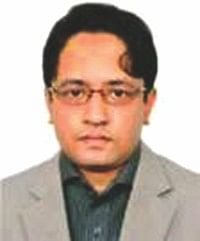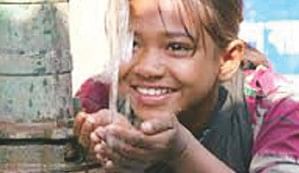Thoughts on World Water Day 2014

I was trying to think about this topic and asked myself what would be the key words that might come into my mind when I talk about the World Water Day. It doesn't need to be something with this year's theme, but should be something that tantalizes my mind with inquisitiveness.
The first word came into my mind was 'availability'. I need to travel a lot for program implementation and my last trip was in Bandarban, a beautiful landscape that keeps Bangladesh green and healthy! I had the opportunity to talk to the ethnic minority people in a beautiful village of Thanchi Upazila. The village was on top of a hill and I saw women and children going down from the hill to collect water. I heard from them that it takes more than an hour to collect a few jars of water from the downstream and they have to do this every day.
While this discussion was going on gender became an important entry point. In most of the hard-to-reach areas of Bangladesh, women are the driving force of the economy and they also contribute to social transformation. In case of water supply and sanitation both men and women play important roles. Women in Chittagong Hill Tracts, Tea garden areas and Haor areas work hard to collect safe drinking water for their family members. Government and development organizations played crucial roles to achieve high coverage in terms of safe drinking water. However, they had to rely on the community people and women were the focus of this development process as most of the achievements were made through Community Led Total Sanitation process or by following similar approaches. However, it was felt that if men were not consulted as well, the process could not be completed properly as both men and women have their stakes in development process.

When we talk about men and women, child rights and child protection could not be ignored. Children are the future of a state and without addressing their needs; we will not be able to mainstream development of the country. Water, sanitation remains incomplete if hygiene behavior is not practiced and in most of the cases children learn these behaviors from schools. So, it is very important that the teachers are well aware about the importance of water supply at school and letting the children using those facilities. It is also important to think about menstrual hygiene management system at school. A major portion of school going children are adolescent girls and it will be extremely shameful if they need to skip classes just because there is no separate facilities for the girls.
Moreover, it is always a good decision to invest inchildren. They are the future generation and if we invest in them, it becomes generational investment. If today's children learn how to wash their hands properly and what are the health impacts of poor water, sanitation and hygiene (WASH) practice, then they will pass on these messages to their grandchildren thus helping us in attaining a golden future.
It will be unjust if we talk about universal coverage but don't address the needs of the disabled people. It is worth noting that the disabled people are actually especially able and are capable of doing some great works. The greatest scientist of all time Stephen Hawking is a wheelchair user and just by sitting there and having an enabling environment, made an everlasting change in the history of modern science. This is a shame that when the world is moving so fast, we could not make enough facilities for the disabled people. There are many children going out of school or could not even get admission just because of their disability. Disability friendly WASH services should be ensured at every sphere of the society.
There are geographical difficulties and social norms that sometimes lead some people not having enough access to WASH services. As discussed, tea pickers, ethnic minorities, sex workers, pavement dwellers, transgenders, sweepers and many other different groups of people are often left out of WASH services due to discrimination and inequity. This is important that the WASH rights of these people are addressed properly in policies and strategies according to our constitution that strongly upholds the rights of poor and marginalized.

While discussing the humane economics of world water day, services for the slum dwellers or ensuring progressive tariff system for having safeguard for the poor can't be ignored. Alternative water technology or services like rain water harvesting system, gravity flow system, infiltration gallery etc. different types of innovation will be necessary to be tested and widely replicated. Absence of government and development organizations presence in dealing with arsenic contamination or transboundary water might cause a long lasting impact in the water mining situation of the country.
There will be world water day every year; there will be many new themes, perhaps few old ones as well. But the guiding principle should be simple and straight. Each and every citizen of the country should have access to safe drinking water and the government is responsible to ensure that for them. Government luckily doesn't need to rely only on the capacity of their own resources but can also engage others for this great cause. Ensuring safe drinking water for all thus could play the trick on the world water day or any other day of the year.
The writer is a development economist and public health professional and could be reached at [email protected]

 For all latest news, follow The Daily Star's Google News channel.
For all latest news, follow The Daily Star's Google News channel. 



Comments